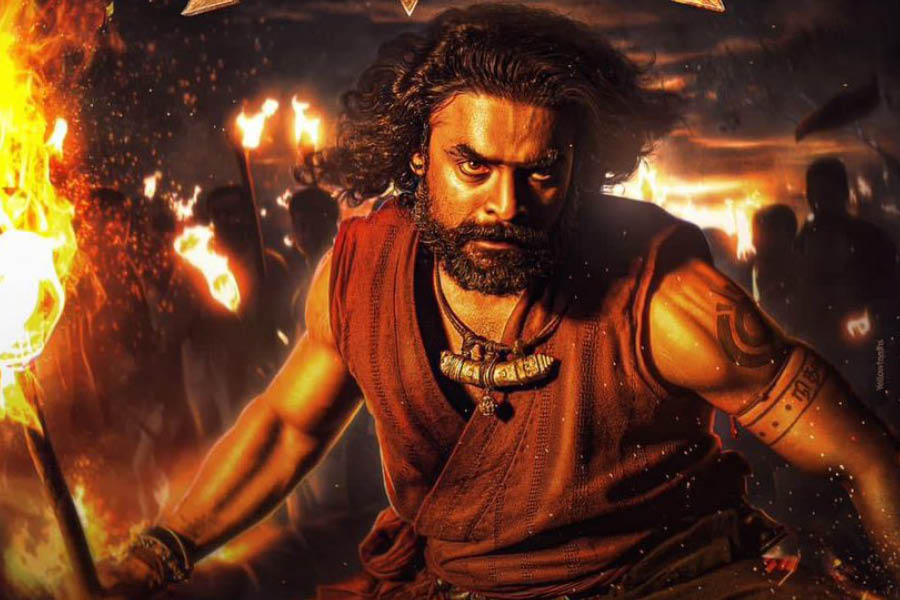Ajayante Randam Moshanam (A.R.M.) by first-time director Jithin Laal is a sprawling visual spectacle in Malayalam that merges fantasy, adventure and action across three timelines, with Tovino Thomas in a triple role.
A.R.M. opens with Kunjikelu (Tovino Thomas), a Kalaripayattu warrior in the 1900s tasked with liberating a market in Haripuram from foreign invaders. As a reward for his bravery, the king offers him any reward of his liking. Kunjikelu chooses the Chiyyothi Vilakku, a sacred lamp crafted from a meteor that landed in the region years ago. Locked up inside a temple, the lamp is out of bounds for people belonging to lower castes and Kunjikelu wants to make the lamp accessible to all. His noble aspirations are thwarted by the king, who deceives Kunjikelu by giving him a fake statue. This theme of caste oppression is a constant undercurrent in all three timelines.
In the second era, we are introduced to Maniyan (Tovino Thomas again), a legendary thief in 1957 whose martial arts skills and agility make him a terror for the elites of Haripuram. Born into a lower caste, Maniyan and his family face constant oppression. He hatches a plan to steal the Chiyyothi Vilakku for his wife after she is humiliated by the temple authorities but Maniyan is nabbed by the locals and killed. Maniyan’s death leaves his family shattered, and the trauma of this event casts a shadow over the third and final timeline.
It’s the 1990s and Maniyan’s grandson Ajayan (also played by Thomas) is an electrician who’s trying to escape his family’s tainted legacy. However, the locals continue to view him with suspicion, pegging him as a potential thief, much like his grandfather. Ajayan’s only reprieve comes from his relationship with Lakshmi (Krithi Shetty), who belongs to an affluent family. While Ajayan strives to leave his past behind, fate draws him back to the Chiyyothi Vilakku, leading to an explosive climax that intertwines his story with those of his ancestors.
At its core, A.R.M. is a film about caste oppression and the weight of legacy. The Chiyyothi Vilakku, in all three timelines, becomes a symbol of access denied. Caste discrimination is not just a backdrop but a driving force in the characters’ lives in A.R.M. Even in the 1990s, Ajayan and his mother (Rohini) are forbidden from entering the Chiyyothi Kaavu temple.
There’s also Sudev Varma (Harish Uthaman), hailing from the royal family of Haripuram, who visits Ajayan’s village on the pretext of making a documentary. But his real intention is to steal the Chiyyothi Vilakku because he believes it rightfully belongs to his family. Sudev claims to have dropped his caste surname in an attempt to appear progressive. However, we also witness his discomfort when touched by a Dalit man.
A.R.M. is a showcase for Tovino Thomas, with three distinct characters from three eras — from Kunjikelu’s stoic warrior presence to Maniyan’s rebellious ferocity to Ajayan’s reluctant heroism. Thomas is scintillating as Maniyan, whose story stands out for its intensity. In contrast, Ajayan’s storyline, which makes up the better part of the film, allows Thomas to go for a more nuanced performance. Sujith Nambiar’s screenplay cleverly ties together the fates of Kunjikelu, Maniyan and Ajayan, although the transitions between timelines occasionally feel disjointed.
Visually, A.R.M. is a triumph. Jomon T John’s cinematography distinguishes each timeline with a distinct palette and atmosphere. The 1900s are bathed in golden hues, evoking a sense of ancient myth, while the 1950s are grittier, with the dusty, oppressive visuals complementing Maniyan’s outlaw life. The 1990s offer a more muted, urban landscape, capturing the village’s slow march towards modernity.
The action choreography by Vikram Mor and Phoenix Prabhu is also a highlight of the film. It avoids over-the-top, gravity-defying heroics and draws instead from native martial arts traditions like Kalaripayattu, but the slow-motion shots in the action set pieces are an overkill.











